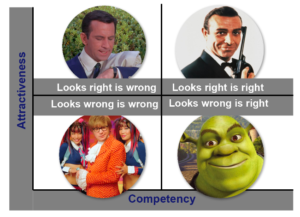It is well documented that a wrong hire can cost three times the salary of the poor hire, after you take into account the loss in productivity, workplace disruption and new hiring costs. If you reflect on every great hire that you have made or every great person that you have worked with, the most critical factor has been a positive/ “can do attitude” – a willingness to listen and help. This attribute will always outweigh great knowledge or skills.
Sometimes people look wrong but are really really right- just like Shreks!
When interviewing both internally and externally, there are two considerations: their level of competency and their presentation style. Don’t get swamped by presentation style – look for the right attitude. People can look right and are wrong and you can miss opportunities of people who look wrong but are right. I like to call them the “Shreks” of your business, as suggested in this picture:

In conclusion, you do not want to miss the “Shreks” in your hiring decisions and with a year of change forecasted, you need to be able to recognise the “Shreks” currently in your business, that may be unnoticed and aim to provide new motivators and career opportunities to them, as they may not otherwise stay around!
Be aware that level of attractiveness does not indicate a person’s level of competency. Make sure you do not have unconscious biases when judging a person’s capabilty. Reference thoroughly, do capabilty testing, assessments, competency questionnaires and sight previous examples of achievements to back capabilties.
For more information contact Simone Allan, Director at Mondo Search on 1300 737 917 or email : simone@mondosearch.com.au.
Copyright:
The above is the intellectual property of Mondo Search Pty Ltd. None of the information provided may be copied or reproduced in part or in full without the prior written permission of a director of Mondo Search Pty Ltd

